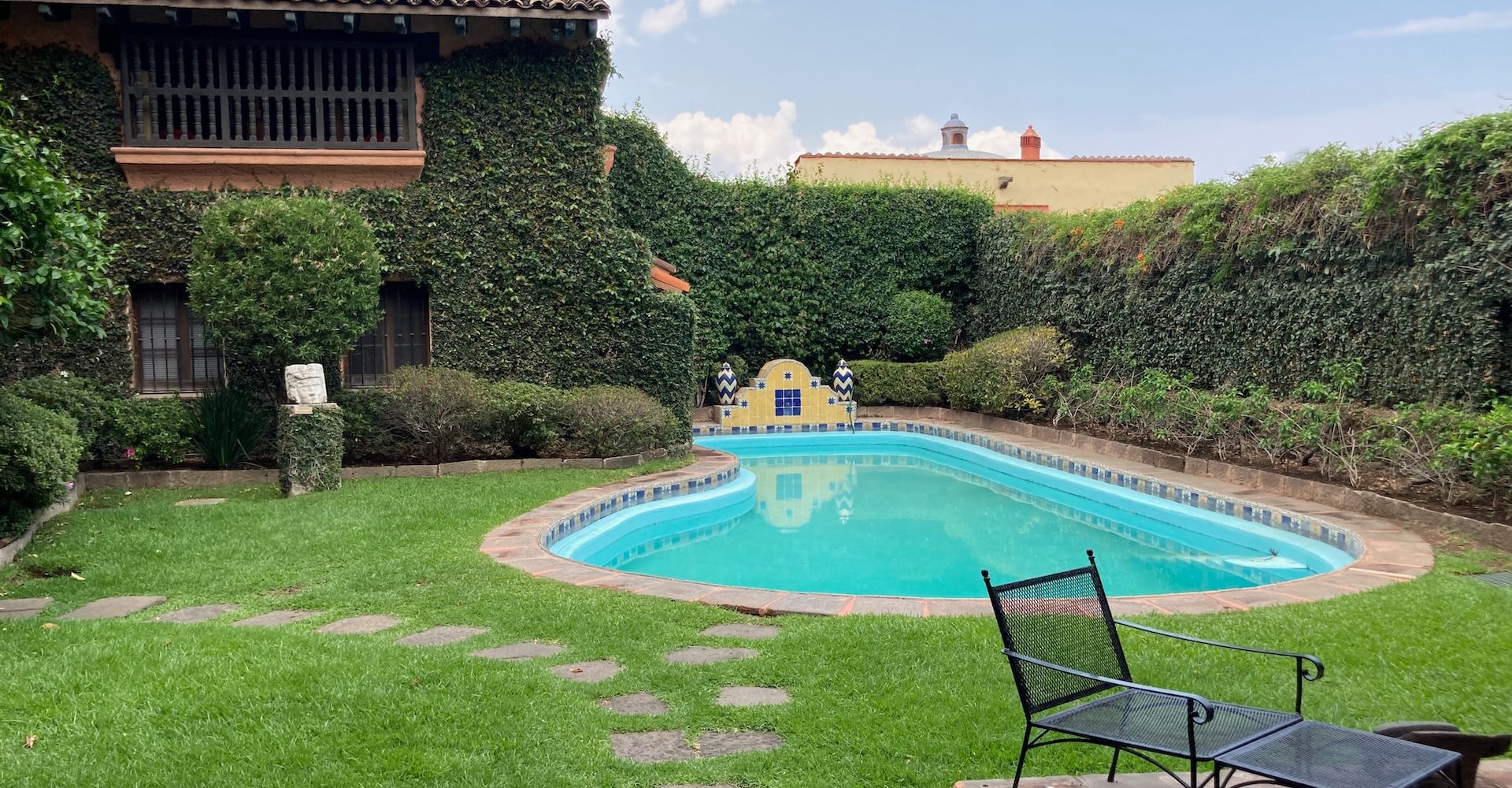
When it comes to creating the perfect backyard retreat, it’s hard to beat the benefits of your own swimming pool. Whether you’re looking to cool off during the hot summer months, host the perfect party, or tackle some low-impact exercise, there’s a pool out there for you.
However, with so many types of swimming pools on the market, finding the right one for your needs can be daunting. In this article, we’ll explore nine different types of swimming pools, each with its own unique features, pros, and cons, and we’ll help you weigh your options to choose the perfect pool to meet your preferences.
When you start to seriously consider purchasing a pool, it becomes clear pretty quickly how many types of swimming pools are out there. Cost can vary from less than a hundred dollars for a decent above-ground pool to hundreds of thousands of dollars for an in-ground paradise. When you’re evaluating different pools, you’ll want to consider a number of factors. We recommend you reflect on the purpose of the pool, your overall budget, the space you have available, your maintenance preferences, and how hands-on you want to be with the installation. Let’s look at each of these considerations in a bit more depth:
Different types of pools match different homeowners’ needs and desires. You may want to spend some time thinking carefully about how you’ll use your pool in a practical sense, as well as what makes you most excited about pool ownership.
Will your pool be used primarily for exercise or play? Are you hoping to host gatherings for friends and extended family or reserve the pool for members of your immediate household? Do you want the pool to be a place where adults escape or where kids hang out all day? Consider how different types of swimming pools intersect with your needs, and be sure that the pool you choose serves the purpose you’re planning on using it for.
It’s important to start your pool-planning process with a sense of how much money you’re able to spend. If you have young children and you’re working on a tight budget, you might be satisfied with a simple kiddie pool or slightly bigger above-ground pool. If you’ve been saving up for a while and you have money to spare, you might want to go all out on an infinity pool or architectural pool. Pricier permanent pools are significant home upgrades, with all the accompanying pros and cons. Just be sure to do your research about what different types of pools cost so you can plan accordingly and not get caught deep in the planning process for a pool you can’t afford.
Pools come in many shapes and sizes, so the amount of space they take up varies considerably. A full-size in-ground pool can sometimes fill an entire backyard. If that’s your hope, you may want to err on the larger side when you’re weighing pool options. But if you’d like to use your yard for gardening or games, a smaller pool might be a better option for you.
Consider not just the size of your outdoor space, but where in your yard it makes the most sense to place a pool. Try imagining how a pool will transform your landscaping, how it may fit in with your patio, and what the path from the backdoor to the pool steps will look like. Recognizing the opportunities and limitations of your outdoor space will help you choose the best pool for you.
In the excitement of pool planning and purchasing, it’s easy to forget that most pools require ongoing maintenance. Just know that certain types of swimming pools demand more attention than others. Some pool types need daily water testing or weekly cleaning, while others might do fine with a more hands-off approach. Maintenance is a huge part of pool ownership, in terms of both time and money. Be sure to research how much energy you’ll be putting into your pool weekly and seasonally—and whether the cost of ongoing upkeep is within your price range.
In-ground pools almost always require professional installation, but above-ground pools are designed for homeowners more interested in handling the pool set-up themselves. If you’re someone who likes to have a hand in all parts of an installation process, an above-ground pool might be right up your alley. If you want to put your pool away for the winter, you might also look at an above-ground option. But if you’re someone who prefers leaving all the tricky parts of construction and preparation to professionals and you have the available funds, an in-ground pool might be right for you.
As you consider the pool options below, be sure to keep all of these important factors in mind.
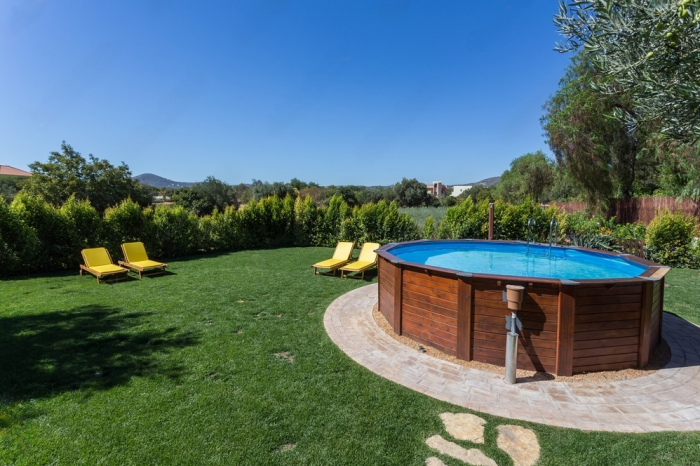
One of the most popular choices for homeowners seeking an affordable and easily removable option is the above-ground pool. As the name suggests, this type of swimming pool is constructed above the ground level and typically made of steel, aluminum, or resin. Above-ground pools are relatively easy to install and require less excavation work than in-ground pools. They also come in a wide range of shapes and sizes to fit different backyard layouts.
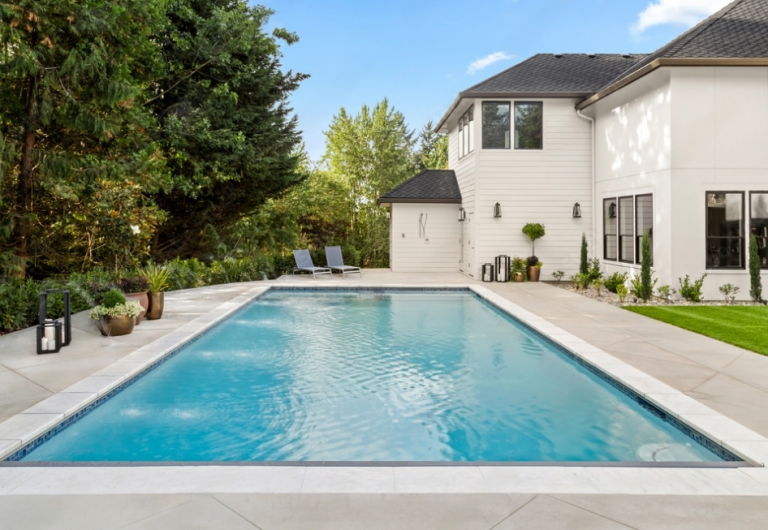
The in-ground pool is a classic choice that offers an attractive and permanent addition to your property. These pools are built by excavating the ground in your yard and then constructing a structure using materials like concrete, fiberglass, or vinyl. In-ground pools provide more design flexibility, allowing you to create a customized pool that blends with your landscape.
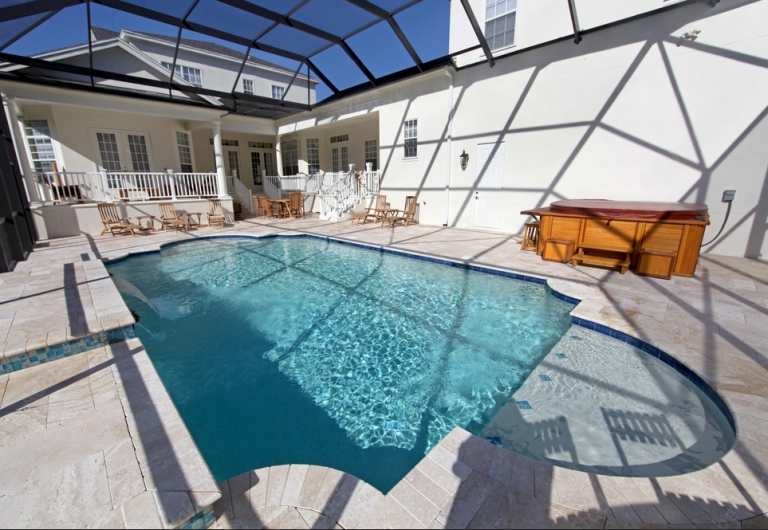
If you’re looking for the types of swimming pools that can be used year-round, regardless of weather conditions, an indoor pool might be the perfect choice for you. Indoor pools are constructed within the confines of a building, typically in a separate room or enclosure. They offer the convenience of swimming whenever you want, without having to worry about any external elements.
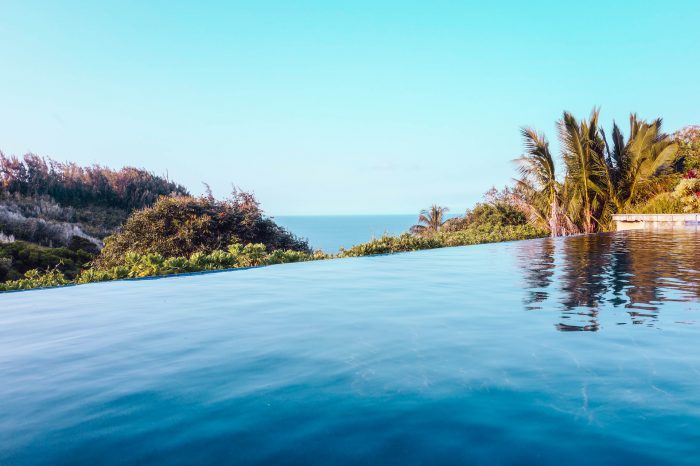
For those seeking an elegant and visually stunning pool, the infinity pool is an excellent choice. Also known as vanishing edge or negative edge pools, infinity pools create the illusion that the water extends endlessly into the horizon. This effect is achieved by designing the pool with one or more edges that appear to blend seamlessly with the surrounding landscape or a body of water, such as the ocean or a lake.
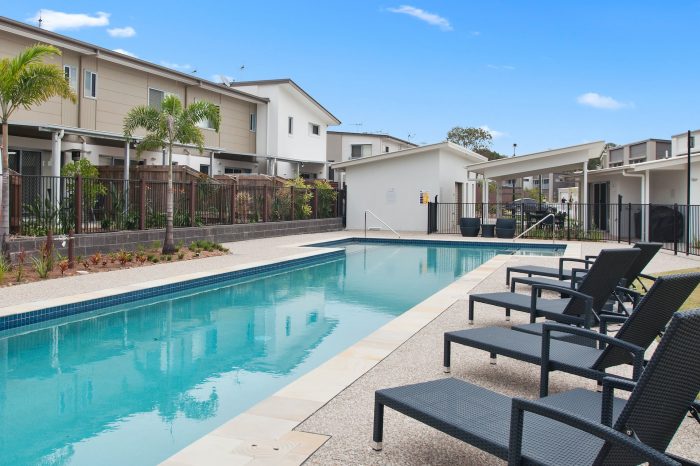
Designed primarily for fitness and exercise purposes, lap pools are long, narrow pools that allow swimmers to swim continuously without interruptions. These types of swimming pools are typically rectangular in shape and provide a straight path for swimmers to swim laps, making them ideal for those who prioritize fitness and endurance training.
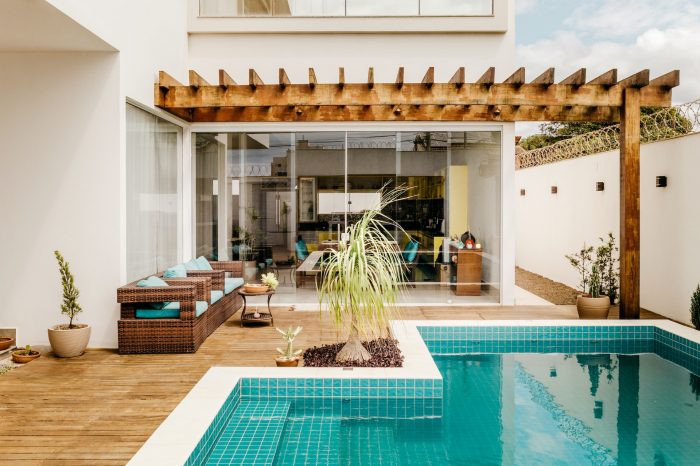
Architectural pools are designed with a strong focus on aesthetics and architectural elements. They often feature unique shapes and intricate designs, and they make creative use of materials for a visually striking effect. These types of swimming pools can serve as a focal point of your outdoor space, blending beautifully with the overall architectural style of your home.
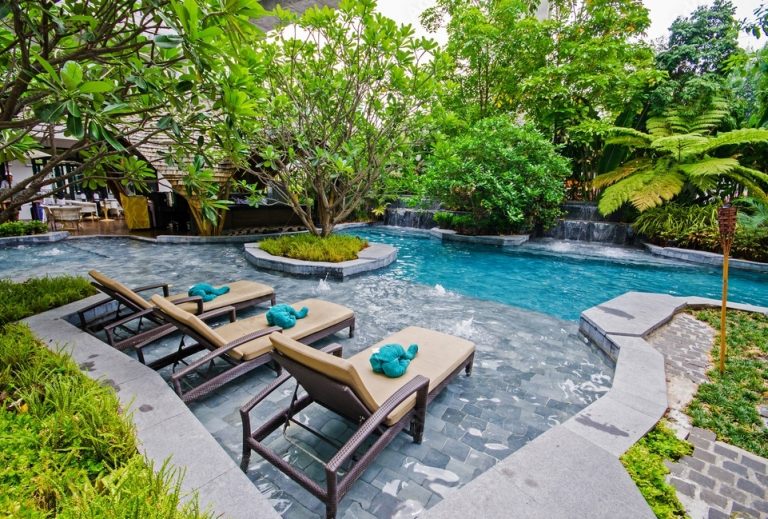
For those who prefer a more eco-friendly and chemical-free swimming experience, a natural pool might be the perfect choice. Natural pools, also known as swimming ponds or biopools, use natural filtration methods instead of traditional chemicals to keep the water clean and clear. These pools often incorporate aquatic plants and biological filters to maintain a healthy balance of microorganisms in the water.
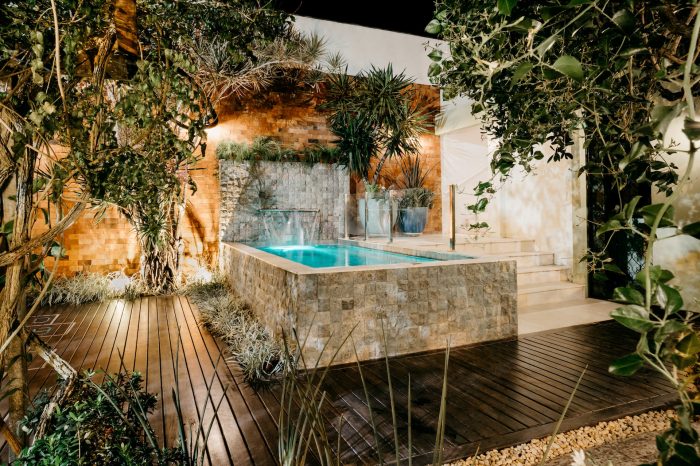
A combination of a spa and a pool, a spool offers the best of both worlds. Spools are compact pools that are typically smaller in size, making them ideal for more confined backyards or spaces. They provide the relaxation and therapeutic benefits of a spa, along with the option for a quick dip or swim.
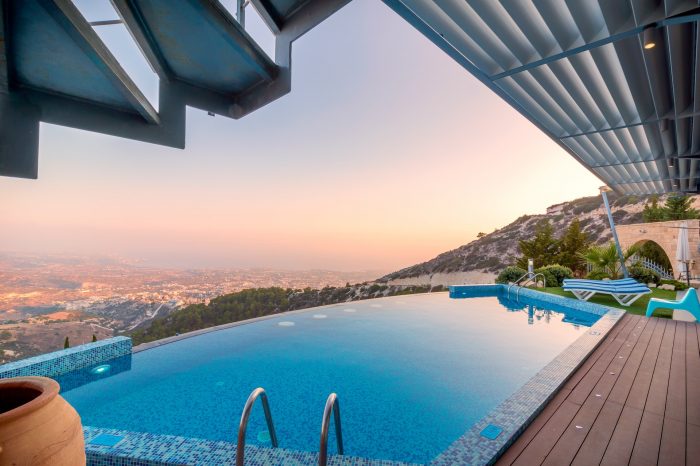
Saltwater pools have gained popularity in recent years due to their perceived benefits and lower reliance on traditional chlorine-based systems. These types of swimming pools use a salt chlorine generator to convert salt into chlorine, providing a gentler and more natural swimming experience. Saltwater pools are known for their silky-smooth water texture and reduced chemical odors.
When it comes to selecting the perfect pool for your needs, weighing the pros and cons of various types of swimming pools is essential. Different pool options cater to different spaces, budgets, and overall preferences.
Take the time to assess your priorities, price range, available space, and maintenance requirements before making a decision. And remember to consult with pool professionals to ensure that the pool you choose aligns with your property’s characteristics and local regulations. With the right pool in place, you can create a backyard haven that provides endless enjoyment, relaxation, and health benefits for years to come.